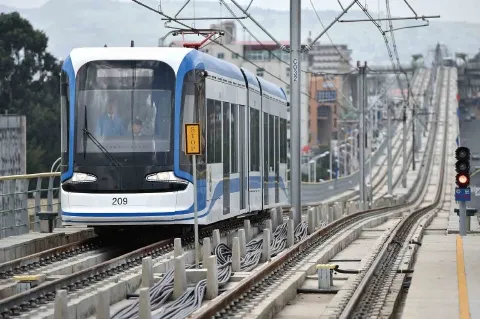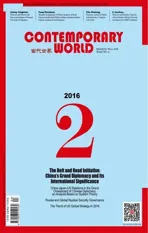The Silk Road Initiative of China is a Step Forward in Globalization
2016-11-23MELAkUMULUALEMKELEMEWoRk
MELAkU MULUALEM KELEMEWoRk
Training Department Head, the Ethiopian International Institute for Peace and Development (EIIPD)
The Silk Road Initiative of China is a Step Forward in Globalization
MELAkU MULUALEM KELEMEWoRk
Training Department Head, the Ethiopian International Institute for Peace and Development (EIIPD)
After the opening up policy of China, the government has worked hard to benefit from the process of globalization. Starting from 1990, China joins more international organizations and is now a member of most of the important international institutions. Joining the World Trade Organization in 1995 was a leap forward for China to be fully opening up and to share from the benefits of globalization.
In 2013 Chinese President Xi Jinping took a new initiative called “Jointly Building the Silk Road Economic Belt and the 21st-Century Maritime Silk Road”. With this initiative China will pump multibillion dollars into many projects alongside the ancient Silk Road. Even if the initiative took a name called “Silk Road” , the projects are not limited to the ancient routes of the Silk Road. For this initiative China will use her reserved money for constructing infrastructures in many countries of the world. China will also collaborate with other multilateral financial institutions to work on various projects. This is a good opportunity to least developed countries to benefitfrom big projects.
The basic document of the Silk Road Initiative made clear that China will shoulder more responsibilities and obligation in financing big projects along the Belt and Road. This Initiative of China can fill the gap of injustice in the process of globalization from the West direction. Moreover the positive role of various governments and international organizations will help the initiative to be successful. One can also argue that the Silk Road Initiative will increase the soft power of China in the world. However, the initiative taken by China doesn't benefit only China,but also many countries in the world. Especially least developed countries in Asia can enhance their economic development and in the long run it can help in narrowing the gap between the rich and the poor countries. This is because the initiative has included developments on various dimensions and sectors.
These dimensions include the development of international trade; investment; tourism; peoples-to-peoples relations; infrastructure that includes road, train, port and maritime. This in turn improves communication among governments, non government organizations, and international organizations. From this initiative the least developed countries can benefit a lot from technology transfer, building of infrastructure, job opportunity to local people, facilitating trade and investment, scholarship and training to students, improve research and development and the like.
The initiative of China has great role in maintain peace and security in the world. As well known there are many conflicts and wars in many parts of the world. This initiative, however,advocates tolerances and improves economic relations among countries and subsequently minimizes conflicts. It also improves bilateral and multilateral relations of countries of the world.
The present Silk Road Initiative of China has different approach in maintaining peace and security in the world. Democratic Peace Theory which is emerged in the 1980s argues that “the spread of democracy would lead to greater international security... Wars between democracies are seen as being rare and they are believed to settle mutual conflicts of interest without the threat or use of force more often than non-democratic states”.
On the other hand, Silk Road initiative has nothing to do with democracy. Rather the infrastructure linkage,facilitation of trade and investment in the world would strengthen economic interdependence amongst countries that would lead to international peace and security. Of course the two approaches do not conflict each other. This is to mean that globalization from the West gives priority to democracy so as to maintain international peace and development, however, globalization from the East gives priority to economic interdependence so as to maintain international peace and development.
This initiative also helps to coordinate policies of various governments towards economic development and facilitate trade and investment in the world. The Belt and Road is not “Marshal Plan” of China to other countries. In the historical Marshal Plan (1947),the U.S.A gave finance so as to prevent governments not to fall in the hand of the Union of Soviet Socialist Republics (U.S.S.R). In this historical plan one gives and the other receives.Subsequently the receiver of the fund from the “Marshal Plan” fell under the influence of the U.S.A. However,in the present Belt and Road Initiative beneficiary countries will pay back the money to China and to other development supporting organizations. This will help underdeveloped countries to get support but not to fall under unnecessary sphere of influences.

Most of the African leaders believe China' s presence in Africa is aimed for winwin and mutual benefit, which means the current China-Africa relationship is no neo-colonialism. The picture shows the first African light rail constructed by China goes into official operation in Ethiopia's capital Addis Ababa.
I would also like to argue that unlike the forceful approach of globalization from the West through “Washington Consensus” and deregulation, globalization from the East i.e. the initiative of China is based on the willingness of countries along the side of the Belt. The Breton Woods Institutions namely the IMF and World Bank are engine of globalization from the West. On the other hand,Asian Infrastructure Investment Bank, BRICS, New Development Bank, Shanghai Cooperation Organization financial institutions and the Silk Road Fund will be an engine of globalization from the East.
In reviewing the document of the “Vision and Actions” of China on the Silk Road, the Chinese government has disclosed its great interest to work with many countries based on the following principles and guidelines: respecting international law and international norms, focusing on shared interests, cooperate with other countries based on winwin principles, interaction based on non-interference policy, strengthening multipolar world, learning from each other, respecting the principle of equality and mutual benefit.
In my opinion, this initiative of China is one step forward in globalization. Since it is inclusive to many cultures and peoples the wheel of globalization will speed up in the coming decade. Especially the “unglobalized”or poor countries of the world can benefit from this new and innovative initiative of China. Thus the former“partial” globalization will be extended to make the size of globalized parts of the world to be bigger and bigger. This initiative of China has invited all countries in the world to be part of this global project.
Deng Xiaoping's reform announcement in December 1978 and his open door policy made China's economy to be transformed to fast development. This policy opened China to the outside world. On the other hand the Silk Road Initiative of president Xi Jinping in 2013 will open the market of many countries to the outside world. This 21st initiative is wider and deeper than the open door policy of Deng Xiaoping in the last quarter of the 20th Century. Thus opening the market of many countries of the world will speed up globalization. Comparing with the present globalization process, I would say the Silk Road Initiative is “globalization to the benefit of the poor”.
This initiative of China can face challenges from different directions. These are:
1. Some scholars who have been criticizing the good relationship of China and Africa as the relationship of neo-colonialism are not expected to support this Silk Road Initiative. They may also portray the initiative as neocolonialism of china in many parts of the world.
2. Some governments of Western countries who will have concern on the vast projects of China in the West direction can negatively influence the initiative.
3. The other challenge may come from the environmentalists, who have concerns on the impact of various projects of the initiative on environment.
4. Countries which are not included in the Belt and Road may feel that they are excluded from this benefit. Such feelings may lead them to be road block to various projects of the initiative.
Unlike the U.S.A and the U.S.S.R,China has never been trying to “export” her political ideology to other countries of the world. The non interference policy of China is also to be appreciated. This foreign policy of China will get support from the governments alongside the Belt and Road.
Regarding the relation between Africa and China one source says “Africa needs China, but China needs Africa more.” In this Silk Road initiative about 58 countries alongside the Belt and Road will benefit. For this initiative, East Africa especially ports of Djibouti and Kenya have got primary focus. Hope the initiative will incorporate many African countries in the future. Most African leaders believe that the current China's presence in African is to fulfill each other's national interests. This shows that the relationship between China and African countries is not the relation of neo-colonialism.
As a way forward, China and countries alongside the Belt and Road should develop trust between them and benefit from this innovative idea. There should also be commitment and partnership among governments of the Belt and Road. If China becomes successful in implementing the Silk Road Initiative, globally there will be two centers of globalization. The first center is in the U.S.A and moves towards East direction. And the second center of globalization will be in China and moves towards West direction (alongside the ancient Silk Road route).These two directions of globalization will make the full circle of a globalized world.
With this new dimension of globalization, the least developed countries in the world may get benefit from the globalized economy. In a nut shell,globalization started in China through ancient Silk Road Trade and will be completed by China through Silk Road and Maritime Road Economic Belt of China.
Globalization started in China through ancient Silk Road Trade and will be completed by China through the Belt and Road.
